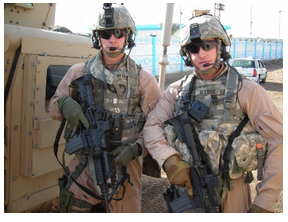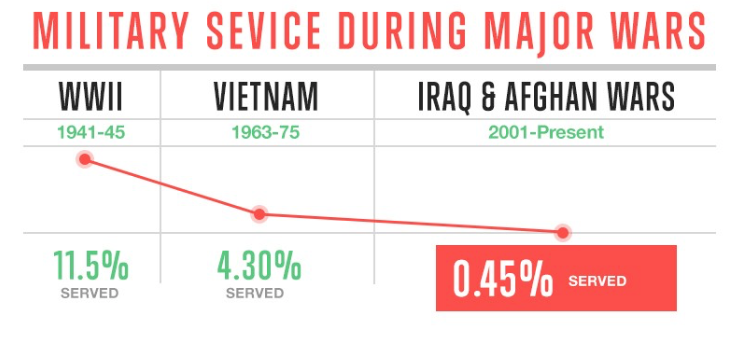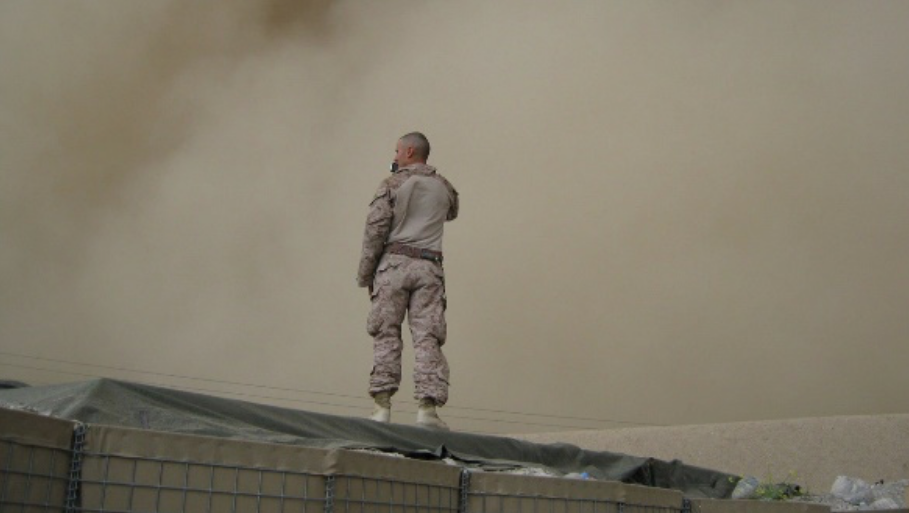CommentsMORE TO WAR THAN GUNS AND BOMBS— I went to the market …Where all the families shop …
I pulled out my Ka-bar … And started to chop … Your left right left right left right kill …Your left right left right you know I will--Military cadence
“You can shoot her…” the First Sergeant tells me. “Technically.” We’re standing on a rooftop watching black smoke pillars rise from a section of the city where two of my teammates are taking machine gun fire. Below, the small cluster of homes we’ve taken over is taking sporadic fire as well. He hands me his rifle with a high-powered scope and says, “See for yourself.”
It’s the 6-year-old girl who gives me flowers.
We call her the Flower Girl. She hangs around our combat outpost because we give her candy and hugs. She gives us flowers in return. What everyone else at the outpost knew (except for me until that day) was that she also carried weapons for insurgents. Sometimes during the midst of a firefight, she would carry ammunition across the street to unknown assailants. According to the Rules of Engagement, we could shoot her. No one ever did. Not even when the First Sergeant morbidly reassured them on a rooftop in the middle of Iraq.
Other soldiers didn’t end up as lucky.
Sometimes they would find themselves paired off against a woman or teenager intent on killing them. So they pulled the trigger. One of sniper teams I worked with recounted an evening where he laid up a pile of people trying to plant an IED. It was a “turkey shoot” he told me laughing. But then he got quiet and said, “Eventually they sent out a woman and this dumb kid.” I didn’t need to ask what happened. His voice said it all.
I often wonder what would have happened if the Flower Girl pointed a rifle at me, but I’m afraid I already know. The thought didn’t matter anyway. There was enough baggage from tours in Afghanistan and Iraq that made coming home a place of uncertainty, anger, and confusion, not, as I had been led to believe, a warm celebration of safety.
 (Left: Iraq circa 2006)
(Left: Iraq circa 2006)
FITTING IN
“People only want to hear the Band of Brothers stories. The one with guts and gusto! Not the one where you jam a gun in an old woman’s face or shoot a kid.” I pause then add, “Look around the room for a second…”
Andy surveys the restaurant we’re in for a moment while I lean in with a sardonic half smile.
“How many people can even relate to what we’ve been through? What would they rather hear about? How Starbucks is giving away free lattes and puppies this week? Or how a soldier feels guilty because he pulled a trigger, lost a friend, or did morally questionable things in war? Hell, I want to hear about the latte giveaway…especially if it’s pumpkin spice.”
This eases the tension and he smiles.
Andy and I feel like we don’t fit in. We met a few years ago at the church where he works, and where I volunteer. Of the thousands of people that attend, we are a handful of veterans in the congregation. It’s often few and far between that I meet other veterans, and those that I do know or have met, typically end up running in the same circles.
Years ago, Andy fought in the siege of Fallujah. Readjusting to normal life after deployment didn’t happen for us. Instead, we found ourselves overly angry, depressed, violent, and drinking a lot. We couldn’t talk to people about war or the cost of it because, well, how do you talk about morally reprehensible things that have left a bruise on your soul?
The guilt and moral tension many veterans feel are not necessarily being dubbed as Post Traumatic Stress Disorder (PTSD) any longer, but Moral Injury. Moral Injury refers to the emotional shame and psychological damage incurred when a soldier has to do things that violate their sense of right and wrong. Shooting a woman or child. Killing another human. Watching a friend die. Black humor and laughing about situations that would normally disgust them.
Because so few in America have served, they can no longer relate to their peers, friends, and family for fear of being viewed as some type of monster, or lauded as a hero when they feel the things they did were morally ambiguous or wrong given the nature of the situations they were involved in.
WHY WE DON’T RELATE
We are currently engaged in one of the longest running wars in the history of the United States. We are entering our 15th year in Afghanistan, and Iraq still has troops stationed in certain outposts. In World War II, 11.5% of the nation served in four years. In Vietnam, 4.3% served in 12 years. Since 2001, only 0.45% of our population has served in the Global War on Terror. Yet, during WWII, 10 million men were drafted, and over 2 million men were conscripted during Vietnam. Despite the length of the Iraq and Afghan Wars, there has been no draft and the burden has been borne by less than a half percent of the population with repeated tours continually deteriorating the mental health of our troops.

The gap between the citizen and the solider is growing ever wider. Whereas in WWII the entire nation’s focus was on purchasing war bonds and defeating the Nazi’s, today’s populace is quickly amused by the latest Kardashian scandal on TV. Because the populace is more concerned about enjoying their freedoms and going about their day to day lives, the veteran can feel like an outcast. As though nothing they did mattered for a country that asked them to go.
This is part of the problem with the alienation a solider feels. People can quickly point out that they didn’t force them to volunteer for the military and fight in a war. They could have stayed home. The counter-point to that argument is that because we have transitioned to an all-volunteer force, those who are opposed should be thanking their lucky stars that the volunteer troops are bearing that burden as opposed to having a draft take place in which they could be in the lottery.
Additionally, regardless of whether you’re Republican, Democrat, Libertarian, Communist, Liberal, Conservative, Conscientious Objector or Pacifist we all sent the soldier overseas. Because we live in a democracy, we vote to put men and women in charge of governing our affairs who send troops overseas. Though we may have voted for someone else or even opposed sending troops overseas, it does not change the fact that we have put ourselves under the governance of the United States. By living in any country in the world, you are submitting yourself to their governing body and laws even if you don’t vote.
Every country on earth has a military of some sort or defense in place, and the lawmakers elected or dictators ruling send young men and women to fight in foreign lands, sometimes unjustly. By shirking responsibility, we only alienate our soldiers more. The moral quagmires they face on the battlefield only continue to dump the weight of shame and guilt onto their shoulders while we all enjoy the benefits of passing the buck and asking, “whose fault is it really?”
DISPOSABLE HEROES
On March 3, 1986, 11 years after the end of the Vietnam War, Metallica released their critically acclaimed album, Master of Puppets. On the album, a song entitled Disposable Heroes told a story of a young man being used as cannon fodder in the midst of war and the terror that enveloped him on the battlefield. Three years later, Metallica would go on to release One, a song about a soldier who has lost all limbs and waits helplessly for death. The song would go on to win a Grammy for Best Metal Performance.
In an odd twist, both songs are amazingly popular among members of the United States military. During my time at the John F. Kennedy Special Warfare Center, we had an entire platoon that could practically sing every lyric to One. In Afghanistan and Iraq, these songs were on playlists to get soldiers amped before missions. We sang songs about being used by the populace to die on their behalf and coming home a vegetable as crazy as that sounds. We sang those songs because they felt true. And the reason they feel true is because of the conversation we refuse to have as a country.
Amy Amidon, a Navy psychologist, stated in an interview regarding moral injury that:
“Civilians are lucky that we still have a sense of naiveté about what the world is like. The average American means well, but what they need to know is that these [military] men and women are seeing incredible evil and coming home with that weighing on them and not knowing how to fit back into society.”

Most of the time, like the conversation Andy and I had, people only want to hear the heroics. They don’t want to listen to what the war is costing our sons and daughters in regard to mental health, and this grows the gap wider. In order for our soldiers to begin healing it’s going to take society owning up to the part it played in sending our troops to war. The people at home may not have pulled the trigger, but they asked the soldier to go in their place. What many don’t realize is that a 2004 study found that “grief over losing a combat buddy was comparable, more than 30 years later, to that of bereaved a spouse whose partner had died in the previous six months.” The soul wounds we experience are much greater and require the society as a whole to come alongside us as opposed to pointing us to the VA.
In most other cultures, soldiers had purification rights when returning home from war. These rites occurred in a broad spectrum of warriors that ranged from the Roman Centurion to the Navajo to the Medieval Knight. Perhaps most fascinating is that soldiers returning home from the Crusades were instructed to observe a period of purification that involved the Christian church and their community. Even though the Church had sanctioned the Crusades, they viewed taking another life as morally wrong and damaging to the souls of their knights. In today’s era, Churches typically put veterans on stage to praise their heroics or speak of a great battle they’ve overcome while drawing spiritual parallels for their congregation, but they don’t talk about war and the moral inequality we’re asking our soldiers to bear on their behalf.
Dr. Jonathan Shay, the clinical psychologist who coined the term Moral Injury, says that in order for the soldier and society to find healing we must come together. He states we must come alongside the soldier and confess:
“What you did was done in our name, at our request. We cannot bear your physical wounds, or psychological scars, but we can bear the moral responsibility with you. Your transgressions in war, they are our transgressions, too. We confess this together and seek forgiveness together.”
Whether you are opposed to or agree with war, what we must remember is that these are our fellow brothers and sisters, sons and daughters, flesh and blood, who are desperate to reconnect with a world they feel no longer understands them. We must try and find common ground together. We’re not asking you to agree with our actions, but help us bear the burden of carrying them on behalf of the country you live in. A staggering 22 veterans take their lives every day, [[[ https://www.mission22.com/#ourcause ]]] and I can guarantee you, part of that is because of the citizen/soldier divide.
But what if it didn’t have to be that way?
What if we could help our men and women in uniform bear the weight of this burden they carry? As holidays like Memorial Day and Veteran’s Day approach, maybe we rethink just exactly what war costs us and what we’ve asked of those who’ve gone on our behalf. In the end, no one in their right mind wants war. We want peace. And no one wants it more than the soldier. As General Douglas McArthur eloquently put it:
“The soldier above all other people prays for peace, for he must suffer and bear the deepest wounds and scars of war.”
(Benjamin Sledge has been a Medium member since 2017. He is a storyteller, combat wounded veteran, Metalhead, Designer, Bleeding on a page just makes it more authentic. Follow his blog.) Prepped for CityWatch by Linda Abrams.
















